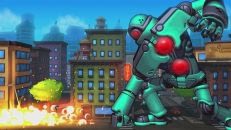IGM Interviews – David Jimenez and Alejandro Santiago (Dimension Drive)
“Space, the final frontier.” Those were the immortal words uttered by Captain Jean-Luc Picard of the Starship Enterprise that prefaced an unforgettable journey into the unknown. In the world of Dimension Drive, an upcoming dual-screen shoot ’em up, space is a frontier that is split into infinite dimensions which are in deep peril; the wicked Ashajuls have emerged, a power hungry race hell-bent on conquering not only a single universe but every last one of its infinite dimensions. Consumed by this insatiable lust, the Ashajuls mercilessly conquered and enslaved other races millennia ago, but one survivor lived to tell the tale. Enter Jackelyne Tywood, a fearless redhead and only child in possession of the only ship in the universe that can stand a chance against the Ashajuls. But can she put a stop to their destructive reign of power? IGM sat down with Dimension Drive developers David Jimenez and Alejandro Santiago to find out.
Indie Game Magazine: Tell us a bit about yourselves and how you got into game development.
David Jimenez: Well I come from Spain, and I’ve been living and working in the Netherlands for the last nine years. I’m very much a science and science-fiction geek, and I’ve always wanted to make video games since I was a child. I studied engineering, which of course included a lot of programming. And once I got here and I was already working, I started studying a course on video game development.
Alejandro Santiago: My case is quite similar to David’s-I also come from Barcelona in Spain. For the last eight years I’ve been living and working here in the Netherlands. I studied science and computer engineering, and I also did my master’s course afterwards. I got my first computer in 1993 and I was programming and making video games in my free time, but after I started studying and working that dream got lost a little bit. Since then, I met David and we decided to start making video games together.
David: Yeah, we actually met here in the Netherlands while working in the Space Agency. We started out just like any other friends, we were playing video games together and then we thought we could reprise this theme of making video games ourselves again.
IGM: Has your work at the European Space Agency influenced the game in any way?
David: Well it’s influenced the game in the sense that it’s set in space of course, but I don’t know if that has to do with us working in the Space Agency or us being sci-fi geeks. I would say a bit of both. I would like to make some things more realistic, considering where we work-such as having real physics in the game and making the ships fly realistically. But when you wanted to stop and move left, it (the physics) was pulling you, so in the end we decided to scrap all that.
IGM: What is the indie game scene like in the Netherlands?
David: It’s kind of fantastic, actually. As I explained earlier, I’ve been living here for nine years, and I was foolish enough not to try and mingle with the indie scene until last year. But last year we started attending conferences, and meeting all these people. Everybody here is really exciting-we met lots of studios, and one of the great things in the Netherlands is the Game Incubator Program for game development studios. So you see a lot of small companies and also big ones that belong in there, things like the Dutch Game Garden, and an incubator opportunity in the north of the Netherlands called Inditopia.
IGM: How long has Dimension Drive been in development for?
David: It’s a long story. We did a lot of work on Dimension years ago, and we had built it for a different engine-it wasn’t in 3D, it was in 2D. We did a prototype of this concept called Dimension Jumper, and we were building that for the Xbox 360 using XNA. We worked on that for a while, and we more or less stopped the project. But at the beginning of last year, or end of 2013 I would say, we decided to take that concept back and make it into a full game. We also decided to abandon XNA because Microsoft discontinued it, and we thought it wasn’t a good idea to continue on that engine. So as we only had a prototype at that moment, we decided to move everything to Unity. We are in the middle of full speed development now, which we started at the beginning of last year, 2014.
IGM: Game designer Nicole Lazzaro has described four main types of fun in games: Easy fun, serious fun, social fun, and hard fun. Which type of fun does Dimension Drive fall into?
David: It’s not serious or social, I would say it’s between easy and hard depending on the (skill) level of the player. I think we are going after hard fun, but we didn’t want to scare away beginners in this genre. If you played the demo of the Beta version, you will know it’s quite difficult. But we think that people will have fun while playing it. Of course, for the final game we don’t want to start off with so much difficulty, so we are creating easier levels to build up the difficulty in a more gradual way.
IGM: How did you come up with the dual screen mechanic?
David: As I mentioned before, we were working on Dimension Jumper in the past and that’s how this idea came about. But specifically, we were discussing what we wanted to do with our first game, and we decided we wanted to do something in space-that was a given. So then we talked about our childhoods and all these space shooters like Galaga, Defender and Gradius, R-Type-all those. And we started playing them on our computers and our TVs, but the problem with most of these games is they are in the center of the screen. But our screens are wider and we are losing lots of space, just because the game was a Shoot ’em up. At some point, we saw some YouTube videos of Japanese players playing co-op, but just a single person. So you just see two games side by side, one person playing two games. We tried to do that, but it was too crazy. Then we thought about how we could have two games, one on the left and one on the right.
Continued On Page: 1 2





